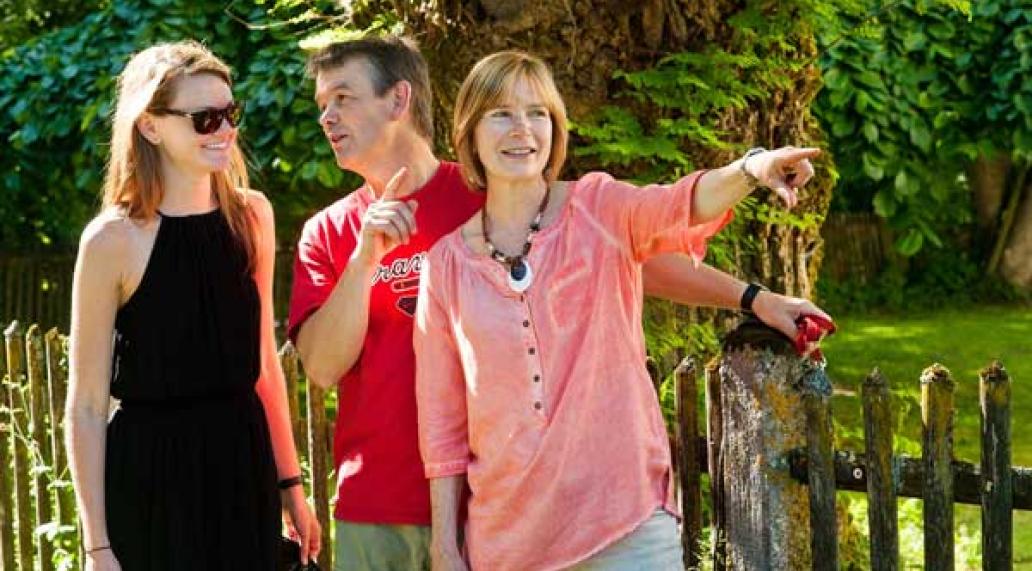
Language Tutor Kaitlyn:
Kaitlyn, 24 from Orlando (far left in the picture), is an elementary school teacher and graduated three years ago. For the summer vacation, which lasts 8 weeks, she has decided to get to know a foreign culture and do something completely new. And so she came to Germany, where she has never been and knows no one, to speak English with a German family. She will stay for 5 weeks, and she even paid several hundred dollars to an exchange organization in the USA, which organizes the stay and selects applicants.
She is currently living with the Caudera-Preil family, who, as experienced owners of an au pair agency, have just started this program. After just a few days, both sides can report that the concept is a great benefit for everyone involved. ```
Since when has this language tutoring program existed, Ms. Caudera-Preil?
This is quite new: we started at the beginning of the year and have already successfully brought together several tutors and families. I am one of our first customers myself because I have a young woman from the USA at our home so I can delve a little deeper into this matter.
What exactly is the idea?
It is a friendly guest arrangement: you offer a room with board and lodging and in return receive language lessons that are fun and run almost incidentally. This can be 15 hours per week, as is standard, but also more or less, depending on the agreement. The stay can last from a few weeks to a maximum of three months, as this is how long the tutors can easily stay here in Germany on a visitor visa. The exact times when the language tutor is available are determined by the host family and the tutor together, and they should come to an agreement. It's not as if one side dictates the terms.
Do the language tutors also speak German?
No, they usually do not, and that is also part of the concept, because they come to families to support, for example, schoolchildren or working people who want to improve their English, in their native language. This usually happens in an informal context, such as cooking in the kitchen, going to the market together, doing sports, or just taking a walk. It has nothing to do with dry-as-dust lessons. Nevertheless, the language tutors don't come unprepared, they have a manual and suggestions to make the language lessons meaningful.
How old are the tutors who go into the families? What kind of people are they?
Most of them are between 19 and their late 20s, and they do this out of an interest in other cultures. Many work as elementary school teachers or in other educational professions. They are eager to work with children and experience something new. These are open-minded young people who want to get to know our country and impart knowledge.
From which countries do you provide language tutors?
We have recently partnered with Mexico for Spanish tutors and with France, in addition to the USA, as these are also world languages that are in high demand.
Where do you see the main advantage of having such a tutor at home?
There is no better way to learn a foreign language—if you don't have the opportunity to spend a long time in the foreign country. This way, you bring the vibrant language home, without needing to attend a community college course or organize a language trip that requires a lot of time and money. Especially for students or professionals who realize they actually need intensive support, this is a great thing.
And if you just can't get along with the guest tutor, then what?
Then, unfortunately, you have to cancel the matter, but this has not happened so far. What the young guest tutors do afterwards is up to them – they could also travel around the country or simply return home. The good thing about this program is that you, as a host family, are not dependent on this tutor, as is often the case with an au pair, where there can be real problems with employment if childcare falls through. Here, everything is voluntary. In the best case, a friendship between the host family and tutor even develops.
What costs will the host family incur?
These are only the brokerage fees, which depend on the length of the stay, and range between 330 and 450 €. And on top of that, of course, the costs for food, drinks, and slightly higher utility expenses. But additional costs such as insurance do not apply.
Do the tutors also provide childcare?
This can be arranged separately, but not for money, as this would not be possible under the tourist visa. Instead, one can offer to pay for a language course or other educational offerings—families have already tested this and found it to be good.
If you are interested in the language tutoring program, please feel free to contact us:
julia.heim@famplus.de or by phone at 089/809902703


